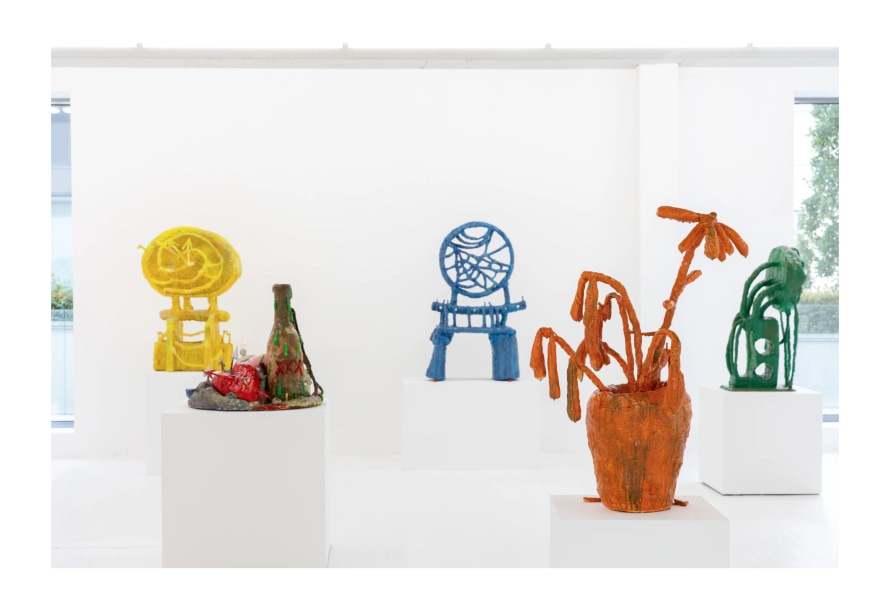28 september 2023, Yves Joris
Tom Volkaert confronts us with death in A Romantic Weekend at Freeman Ranch
Imagine being on a ranch in Texas surrounded by dozens of corpses in various stages of decomposition. Some are in cages, others are exposed to the sun and animals. You see rotting flesh, bleached bones, crawling insects and blossoming flowers. This is not a horror movie, but a scientific experiment. Welcome to the Freeman Ranch Body Farm, the source of inspiration for A Romantic Weekend at Freeman Ranch, Tom Volkaert's new solo exhibition at Everyday Gallery.
Death is an age-old subject that has always fascinated and challenged artists. It is a theme that simultaneously evokes horror and curiosity, and is often seen as a mysterious dance between light and shadow. How can we understand, imagine and process death? How can we give death a place in our lives?
In his new exhibition, Tom Volkaert (34, Belgium) takes this insight as the starting point for a careful reflection on the way in which life and death intertwine. He integrates personal experiences, including the loss of his dear friend Daan Gielis with iconic elements from art history, such as the memento mori and symbolism of the heart. In this way, he creates a space where love and loss, escapism and life force, illness and health are no longer seen as opposites, but as complementary forces that are intertwined.

Tom Volkaert, A Little Molly A Day Keeps The Doctor Away, 2023, Everyday Gallery
The title A Romantic Weekend at Freeman Ranch refers to a research institute at Texas State University, a so-called 'body farm' where researchers focus on the study of the decomposing body. Volkaert has this clinical research facility collide with the loving escapism of a weekend away. That clash, entailing both alienation and considerable humour, is completely sincere: this exhibition is not a biting criticism of a scientific approach to death and certainly does not look down on the naive, romantic approach to transience. He embraces both with equal enthusiasm. And that is precisely the point. In a society in which we hide illness and transience as much as possible and separate them into compartments, Volkaert creates a space in which they can co-exist.

Tom Volkaert, A Romantic Weekend At Freeman Ranch, 2023, Everyday Gallery
The key work is a vanitas still life in which Volkaert brings together many of his themes. It includes a bottle with ‘XXX’ inscription, which refers to illegally distilled alcohol as an alternative to medicine, as well as enlarged, cartoonish pills symbolising official medication. A skull, a timeless symbol of mortality, reminds us of the inescapability of death. But in the middle of it all floats a bowl of Brueghel soup, in which floating letter soup spells the title of the exhibition. This work brings joy, humour and life in the confrontation with transience.
Childlike energy
Alongside these are Volkaert's characteristic Steering Wheels, totem-like figures based on the artist's self-portraits. They evoke the playfulness of children making their first attempts to capture the human form. These figures are infused with vibrant colours and seem to burst with life force, challenging us to rediscover our own energy.

Tom Volkaert, 93:33, 2023, Everyday Gallery
Art becomes a utensil becomes art
Many of the works fulfil a dual role: they are works of art and objects for use, mostly utensils in the personal, intimate sphere. Take the medicine cabinets, for example. The clinical, pharmaceutical approach to health merges with the highly personal experience of using medicines to treat a disease. The image of the heart confirms that intimate experience, but also toys with classical iconography.
A Romantic Weekend At Freeman Ranch shows the world as we know it, but rearranged from Volkaert's creative vision – making the existing world completely new again. The exhibition invites you to broaden your views of death, overcome fear and embrace the joy of life. It creates space where love, illness, pleasure, sadness and loss can coexist and overlap.
The exhibition, an intriguing experience for those who want to explore the complexities of art, life and death, is on display through 15 October 2023 at Everyday Gallery in Antwerp.

Installation shot 'A Romantic Weekend At Freeman Ranch', solo by Tom Volkaert, 2023. Credit Seppe Elewaut
